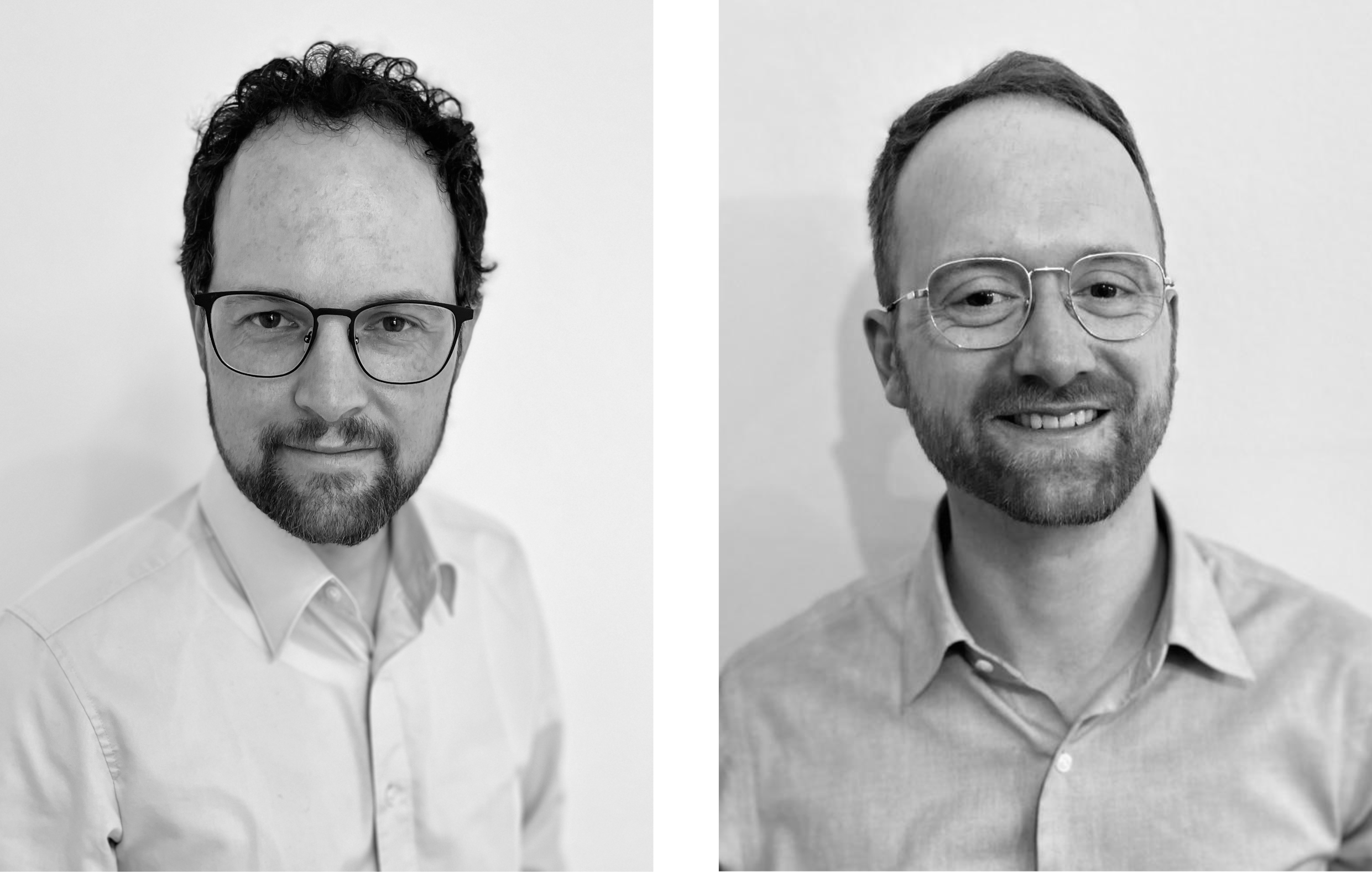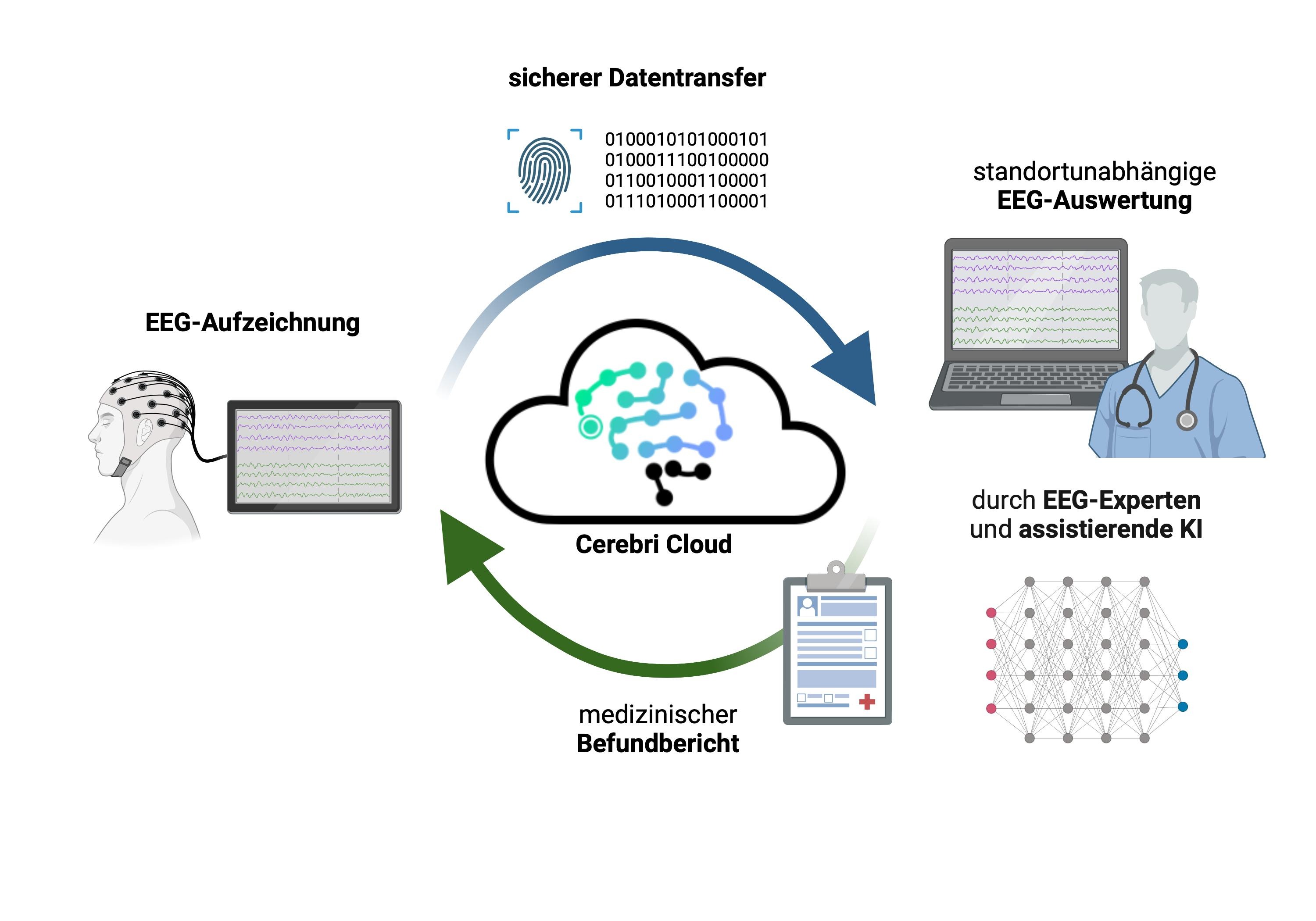Signals are transmitted within nerve cells as electrical impulses. A hundred years ago, on July 6, 1924, Dr. Hans Berger, a neurologist and psychiatrist from Jena, was the first to successfully record these electrical currents in the human brain. He called the resulting wave pattern an ‘Elektrenkephalogramm’, now commonly known as electroencephalogram, or EEG for short. The procedure involves placing numerous electrodes on the scalp to continuously record and visualise potential fluctuations in the cerebral cortex over an extended period of time. An EEG shows multiple waves, each originating from different frequency ranges and corresponding to specific brain regions and activities. Since each person's EEG pattern is unique, there is a wide range of normal diagrams, which makes the analysis highly complex and requires substantial expertise.
Universal demand for EEGs
 The founders of Cerebri GmbH, neurologists Dr. Johannes Lang (left) and PD Dr. Justus Marquetand (right). © Cerebri GmbH
The founders of Cerebri GmbH, neurologists Dr. Johannes Lang (left) and PD Dr. Justus Marquetand (right). © Cerebri GmbHThe primary applications of EEGs are epilepsy diagnostics and assessing consciousness in intensive care and emergency medicine, including determining brain death. "Diagnostically speaking, EEGs are groundbreaking for all brain disorders. They are a universal tool for tracking brain activity," explains PD Dr. Justus Marquetand, formerly a senior physician at the University Hospital of Tübingen’s Department of Neurology. The method is also employed to monitor anaesthesia during operations, assess dementia, and evaluate the effects of medications. His colleague Dr. Johannes Lang from the Epilepsy Centre Erlangen adds, "The EEG is like an ECG of the head. It serves as a functional counterpart to computer tomography, which visualises structural integrity."
Unlike an ECG (electrocardiogram), which can be performed in a few minutes, typically by a general practitioner, an EEG requires significantly more effort. It takes experienced operators around ten minutes just to attach the electrodes, and for untrained personnel the process takes considerably longer. Measurements are typically taken over a thirty-minute period, making the overall time commitment substantial. Additionally, if not routinely used, electrodes are often positioned incorrectly, leading to disturbances in the diagrams. Even with optimal measurement results, assessment requires the expertise of experienced neurologists.
Approximately six million EEG examinations are conducted annually in Germany, but the demand is significantly higher. "There are more and more patients, but fewer and fewer people qualified to carry out and analyse an EEG," says Marquetand, describing the current situation. "This has a major impact on medical decisions, such as accurate diagnosis and treatment. Essentially, an EEG is needed everywhere and at all times. However, just over half of all hospitals in Germany currently have the necessary technical capabilities." Additionally, the emphasis on stroke care in neurology means fewer specialists are acquiring comprehensive EEG expertise during their training. Consequently, only 2.7 percent of clinics in Germany can offer round-the-clock EEG diagnostics, often resulting in long and sometimes detrimental waiting times or high costs if patients have to be transported to another clinic for the procedure.
EEG for everyone, everywhere
Having frequently encountered this issue in their clinical work, the two dedicated epileptologists, Lang and Marquetand, set themselves an ambitious goal: "We want to significantly improve the equity of care delivery in this area. People who live in rural areas should also have easy access to this fundamental examination method at all times," explains Lang. After conducting a thorough needs analysis, the pair founded Cerebri GmbH in January 2024. Partnering with German medical technology manufacturers, the Tübingen-based company developed a new type of EEG cap that can be applied easily and quickly by inexperienced personnel while still delivering high-quality measurement results.1) "But that doesn't help if nobody is able to analyse the EEG," Marquetand adds. "Our core expertise lies in diagnosis; we want to offer this service 24/7 via telemedicine."
The two experts, who between them have assessed thousands of EEGs and offer training in the procedure, are currently collaborating with just a few model clinics. Despite this limited cooperation, there is already significant interest from large clinics as well as small hospitals. However, various legal issues still need to be clarified before the service can be widely implemented. In addition, the neurologists have so far handled all enquiries themselves, despite still being active in clinical and scientific work. In future, they therefore need to be supported by equally well-trained colleagues. It will eventually be possible to assess EEGs while working from home and/or on a part-time basis, thus offering prospects to specialists with young families who are seeking flexible working arrangements.
Development of an assistive AI
 EEG assessment service provided by Cerebri GmbH. EEG recordings are uploaded to the secure Cerebri cloud, where they are analysed by neurologists and certified EEG experts via telemedicine. An electronic report of the findings is sent back to the person who requested it. If necessary, Cerebri can respond quickly urgent cases (e.g. emergency EEG) and a doctor-to-doctor discussion can be arranged to discuss what action to take. Cerebri GmbH is working on its capacity to offer assistive AI in the future to support doctors in analysing EEGs. © Cerebri GmbH
EEG assessment service provided by Cerebri GmbH. EEG recordings are uploaded to the secure Cerebri cloud, where they are analysed by neurologists and certified EEG experts via telemedicine. An electronic report of the findings is sent back to the person who requested it. If necessary, Cerebri can respond quickly urgent cases (e.g. emergency EEG) and a doctor-to-doctor discussion can be arranged to discuss what action to take. Cerebri GmbH is working on its capacity to offer assistive AI in the future to support doctors in analysing EEGs. © Cerebri GmbHHowever, Cerebri aims to go beyond just providing a service and wants to develop assistive artificial intelligence (AI) from the outset. "Currently, there are no suitable data sets for such complex diagnostics," says Lang. "Training AI effectively requires well-evaluated and categorised EEGs that meet uniform standards. With Cerebri, we can guarantee this." The AI will be utilised and continuously refined through an iterative process. Marquetand adds, "Ultimately, a human will always make the final decision and bear the responsibility. EEG assessment relies heavily on pattern recognition, and AI can assist significantly with this."
The founders of Cerebri deliberately chose not to involve private investors, prioritising medical benefits over profitability. Research and development efforts have been, and continue to be, supported by various funding programmes, including the European Space Agency (ESA) programme. Their innovative EEG assessment concept has already garnered recognition, winning second place in the Science2Start Ideas Competition 2023 organised by the STERN BioRegion.2)
Thanks to their solid professional network, including their involvement with the Cyber Valley Stuttgart-Tübingen innovation campus3), Europe’s largest research collaboration in artificial intelligence, Lang and Marquetand regularly exchange both commercial and scientific ideas with peers. They also benefit from the support of the Innovation Board of BIOPRO Baden-Württemberg4), whose experts act as sparring partners, providing valuable guidance and feedback.
Telemedicine will become increasingly important
The start-up's streamlined and focused concept is very promising for the German healthcare system. Using Cerebri’s EEG cap, EEGs could potentially be performed by less experienced staff in small hospitals or even general practitioners’surgeries in the future, with Cerebri providing professional diagnoses. This approach would simplify EEG diagnostics, reduce costs, and importantly, expedite and enhance the quality of assessments. Both physicians agree: "Telemedicine solutions are essential for comprehensive medical progress and improving overall quality of care."